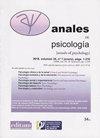我是个恃强凌弱的人吗?小学儿童攻击行为与自我承认欺凌的关系
IF 1.4
4区 心理学
Q3 PSYCHOLOGY
引用次数: 0
摘要
目前的研究重点是在小学欺凌儿童中自我接纳为欺凌者,并研究其与性、教育阶段和欺凌行为类型的关系。我们的目标是更好地理解攻击行为与欺凌自我接纳之间的关系。我们假设攻击性行为与欺凌自我接纳有关。共有4646名7至12岁的小学生参与了这项相关研究。EBIPQ问卷用于评估儿童的攻击行为,而欺凌自我接纳则通过直接问题进行评估。根据他们对EBIPQ的回应,在所有参与者中,14.9%被认为是看涨的,4.4%的人经常看涨。在牛市中,21.4%的人承认曾牛市,这一比例上升到32%的频繁牛市。自我承认是一种欺凌,独立于性别和教育阶段。另一方面,一些攻击性行为比其他行为更多地与自我承认自己是一个暴徒有关。结果表明,儿童不愿将自己视为公牛,特别是在某些类型的攻击行为中。最后,我们讨论了有必要进一步研究影响自认为暴徒的因素。这项研究的重点是被骚扰的小学儿童对攻击性的看法,以及与性别、教育阶段和攻击行为类型的关系。我们的目标是更好地了解侵略行为与被认为是侵略者之间的关系。有人假设,攻击行为将与被认为是攻击者有关。共有4646名7至12岁的学生参加了这项相关研究。EBIPQ问卷用于评估攻击性,而对攻击性的看法则通过直接问题进行评估。根据他们在EBIPQ上的回答,14.9%的参与者被认为是骚扰者,4.4%的参与者被认为是经常骚扰者。21.4%的骚扰者和32%的经常骚扰者承认骚扰过。对侵略者的看法与性别和教育阶段无关。另一方面,一些侵略行为比其他行为更多地与被认为是侵略者有关。结果表明,很难被认为是跟踪者,特别是在某些攻击行为中。最后,讨论了深入研究影响被跟踪者感知的因素的必要性。本文章由计算机程序翻译,如有差异,请以英文原文为准。
Am I a bully? Relationship between aggressive behaviors and self-admission of being a bully in primary school children
The present research focuses on the self-admission of being a bully in primary school children who bully, and studies it in relation to sex, educational stage and type of bullying behavior. Our objective was to understand better the relationship between aggressive behaviors and bullying self-admission. We hypothesized aggressive behaviors would be related to bullying self-admission. A total of 4646 primary school students aged from 7 to 12 years participated in this correlational study. The EBIPQ questionnaire was administered to evaluate children’s aggressive behaviors, whereas bullying self-admission was evaluated through a direct question. From the total of participants, 14.9 % were considered bullies, and 4.4 % frequent bullies, according to their responses to the EBIPQ. Among bullies, 21.4 % admitted having bullied others, and this percentage increased to 32 % for frequent bullies. Self-admission of being a bully was independent of sex and educational stage. On the other hand, some aggressive behaviors were more associated than others to self-admission of being a bully. Results suggest reluctance in children to consider themselves as bullies, especially in some types of aggressive behaviors. Finally, we discuss the need to study further the factors influencing the self-admission of being a bully.
La presente investigación se centra en la percepción de ser agresor en niños de primaria que acosan, y su relación con el sexo, la etapa educativa y el tipo de conducta agresiva. Nuestro objetivo fue comprender mejor la relación entre las conductas agresivas y la percepción de ser agresor. Se hipotetizó que los comportamientos agresivos estarían relacionados con la percepción de ser agresor. Un total de 4646 estudiantes de 7 a 12 años participaron en este estudio correlacional. Se administró el cuestionario EBIPQ para evaluar la agresividad, mientras que la percepción de ser agresor se evaluó con una pregunta directa. Un 14.9 % de los participantes se consideraron acosadores, y un 4.4 % acosadores frecuentes, según sus respuestas en el EBIPQ. Un 21.4 % de los acosadores y un 32 % de los acosadores frecuentes admitieron haber acosado. La percepción de ser agresor fue independiente del sexo y la etapa educativa. Por otra parte, algunas conductas agresivas se asociaron más que otras a la percepción de ser agresor. Los resultados sugieren una dificultad para considerarse acosador, especialmente en ciertas conductas agresivas. Finamente, se discute la necesidad de profundizar en los factores que influyen en la percepción de ser acosador.
求助全文
通过发布文献求助,成功后即可免费获取论文全文。
去求助
来源期刊

Anales De Psicologia
医学-心理学
CiteScore
3.30
自引率
5.90%
发文量
57
审稿时长
4-8 weeks
期刊介绍:
Anales de Psicologia / Annals of Psychology is a multidisciplinary journal of the various thematic areas of scientific psychology. It publishes original research articles and theoretical review in any of its basic, applied and methodological areas included within psychology.
Publishing, financing, marketing and distribution corresponds Editum: Editions of the University of Murcia (Spain). The organizational guidelines and editorial policies come from the Editorial Team (elected for four years by the Areas and / or Departments of Psychology at the University of Murcia) and the Editorial Board, composed of scholars and experts from different universities and institutions national and international. It is published in print (ISSN: 0212-9728) since 1984 and in Internet publishing (web) (ISSN: 1695-2294) since 2000. Available online full text in pdf from the vol. 1 1984.
Anales de Psicologia / Annals of Psychology maintains a system of exchange with other journals and publications of psychology in the world. Through an free exchange agreement with their respective publishers or entities responsible for editing, these journals and publications are received at the University of Murcia (Biblioteca "Luis Vives", near the Faculty of Psychology) and in return, our journal is sent to libraries and educational and research institutions such centers responsible for editing.
 求助内容:
求助内容: 应助结果提醒方式:
应助结果提醒方式:


